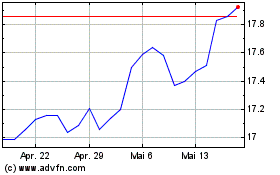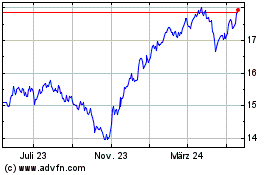First Trust Intermediate Duration Preferred & Income Fund
(the "Fund") (NYSE: FPF) has declared the Fund’s regularly
scheduled monthly common share distribution in the amount of
$0.1275 per share payable on July 15, 2022, to shareholders of
record as of July 5, 2022. The ex-dividend date is expected to be
July 1, 2022. The monthly distribution information for the Fund
appears below.
First Trust
Intermediate Duration Preferred & Income Fund (FPF):
Distribution per share:
$0.1275
Distribution Rate based on the June 17,
2022 NAV of $19.71:
7.76%
Distribution Rate based on the June 17,
2022 closing market price of $17.81:
8.59%
The majority, and possibly all, of this distribution will be
paid out of net investment income earned by the Fund. A portion of
this distribution may come from net short-term realized capital
gains or return of capital. The final determination of the source
and tax status of all 2022 distributions will be made after the end
of 2022 and will be provided on Form 1099-DIV.
The Fund is a diversified, closed-end management investment
company that seeks to provide a high level of current income. The
Fund has a secondary objective of capital appreciation. The Fund
seeks to achieve its investment objectives by investing in
preferred and other income-producing securities. Under normal
market conditions, the Fund will invest at least 80% of its Managed
Assets in a portfolio of preferred and other income-producing
securities issued by U.S. and non-U.S. companies, including
traditional preferred securities, hybrid preferred securities that
have investment and economic characteristics of both preferred
securities and debt securities, floating-rate and fixed-to-floating
rate preferred securities, debt securities, convertible securities
and contingent convertible securities.
First Trust Advisors L.P. ("FTA") is a federally registered
investment advisor and serves as the Fund's investment advisor. FTA
and its affiliate First Trust Portfolios L.P. ("FTP"), a FINRA
registered broker-dealer, are privately-held companies that provide
a variety of investment services. FTA has collective assets under
management or supervision of approximately $203 billion as of May
31, 2022 through unit investment trusts, exchange-traded funds,
closed-end funds, mutual funds and separate managed accounts. FTA
is the supervisor of the First Trust unit investment trusts, while
FTP is the sponsor. FTP is also a distributor of mutual fund shares
and exchange-traded fund creation units. FTA and FTP are based in
Wheaton, Illinois.
Stonebridge Advisors LLC ("Stonebridge"), the Fund's investment
sub-advisor, is a registered investment advisor specializing in
preferred and hybrid securities. Stonebridge was formed in December
2004 by First Trust Portfolios L.P. and Stonebridge Asset
Management, LLC. The company had assets under management or
supervision of approximately $13.4 billion as of May 31, 2022.
These assets come from separate managed accounts, unified managed
accounts, unit investment trusts, an open-end mutual fund, actively
managed exchange-traded funds, and the Fund.
Principal Risk Factors: Risks are inherent in all investing.
Certain risks applicable to the fund are identified below. The
principal risks of investing in the fund are spelled out in the
fund’s shareholder reports. The order of the below risk factors
does not indicate the significance of any particular risk
factor.
Past performance is no assurance of future results. Investment
return and market value of an investment in the Fund will
fluctuate. Shares, when sold, may be worth more or less than their
original cost. There can be no assurance that the Fund's investment
objectives will be achieved. The Fund may not be appropriate for
all investors.
Securities held by a fund, as well as shares of a fund itself,
are subject to market fluctuations caused by factors such as
general economic conditions, political events, regulatory or market
developments, changes in interest rates and perceived trends in
securities prices. Shares of a fund could decline in value or
underperform other investments as a result of the risk of loss
associated with these market fluctuations. In addition, local,
regional or global events such as war, acts of terrorism, spread of
infectious diseases or other public health issues, recessions, or
other events could have a significant negative impact on a fund and
its investments. Such events may affect certain geographic regions,
countries, sectors and industries more significantly than others.
In February 2022, Russia invaded Ukraine which has caused and could
continue to cause significant market disruptions and volatility
within the markets in Russia, Europe, and the United States. The
hostilities and sanctions resulting from those hostilities could
have a significant impact on certain fund investments as well as
fund performance. The outbreak of the respiratory disease
designated as COVID-19 in December 2019 has caused significant
volatility and declines in global financial markets, which have
caused losses for investors. While the development of vaccines has
slowed the spread of the virus and allowed for the resumption of
"reasonably" normal business activity in the United States, many
countries continue to impose lockdown measures in an attempt to
slow the spread. Additionally, there is no guarantee that vaccines
will be effective against emerging variants of the disease.
Preferred/hybrid and debt securities in which the Fund invests
are subject to various risks, including credit risk, interest rate
risk, and call risk. Credit risk is the risk that an issuer of a
security will be unable or unwilling to make dividend, interest
and/or principal payments when due and that the value of a security
may decline as a result. Credit risk may be heightened for the Fund
because it invests in below investment grade securities, which
involve greater risks than investment grade securities, including
the possibility of dividend or interest deferral, default or
bankruptcy. Interest rate risk is the risk that the value of
fixed-rate securities in the Fund will decline because of rising
market interest rates. Call risk is the risk that performance could
be adversely impacted if an issuer calls higher-yielding debt
instruments held by the Fund. These securities are also subject to
issuer risk, floating rate and fixed-to-floating rate risk,
prepayment risk, reinvestment risk, subordination risk and
liquidity risk.
The risks associated with trust preferred securities typically
include the financial condition of the financial institution that
creates the trust, as the trust typically has no business
operations other than holding the subordinated debt issued by the
financial institution and issuing the trust preferred securities
and common stock backed by the subordinated debt
Interest rate risk is the risk that securities will decline in
value because of changes in market interest rates. The duration of
a security will be expected to change over time with changes in
market factors and time to maturity. Although the Fund seeks to
maintain a duration, under normal market circumstances, excluding
the effects of leverage, of between three and eight years, if the
effect of the Fund's use of leverage was included in calculating
duration, it could result in a longer duration for the Fund.
Because the Fund is concentrated in the financials sector, it
will be more susceptible to adverse economic or regulatory
occurrences affecting this sector, such as changes in interest
rates, loan concentration and competition.
Investment in non-U.S. securities is subject to the risk of
currency fluctuations and to economic and political risks
associated with such foreign countries.
Investments in securities of issuers located in emerging market
countries are considered speculative and there is a heightened risk
of investing in emerging markets securities. Financial and other
reporting by companies and government entities also may be less
reliable in emerging market countries. Shareholder claims that are
available in the U.S., as well as regulatory oversight and
authority that is common in the U.S., including for claims based on
fraud, may be difficult or impossible for shareholders of
securities in emerging market countries or for U.S. authorities to
pursue.
To the extent a fund invests in floating or variable rate
obligations that use the London Interbank Offered Rate ("LIBOR") as
a reference interest rate, it is subject to LIBOR Risk. The United
Kingdom's Financial Conduct Authority, which regulates LIBOR has
ceased making LIBOR available as a reference rate over a phase-out
period that began December 31, 2021. There is no assurance that any
alternative reference rate, including the Secured Overnight
Financing Rate ("SOFR") will be similar to or produce the same
value or economic equivalence as LIBOR or that instruments using an
alternative rate will have the same volume or liquidity. The
unavailability or replacement of LIBOR may affect the value,
liquidity or return on certain fund investments and may result in
costs incurred in connection with closing out positions and
entering into new trades. Any potential effects of the transition
away from LIBOR on the fund or on certain instruments in which the
fund invests can be difficult to ascertain, and they may vary
depending on a variety of factors, and they could result in losses
to the fund.
Contingent Capital Securities provide for mandatory conversion
into common stock of the issuer under certain circumstances, which
may limit the potential for income and capital appreciation and,
under certain circumstances, may result in complete loss of the
value of the investment.
Reverse repurchase agreements involve leverage risk, the risk
that the purchaser fails to return the securities as agreed upon,
files for bankruptcy or becomes insolvent. The Fund may be
restricted from taking normal portfolio actions during such time,
could be subject to loss to the extent that the proceeds of the
agreement are less than the value of securities subject to the
agreement and may experience adverse tax consequences.
Use of leverage can result in additional risk and cost, and can
magnify the effect of any losses.
The risks of investing in the Fund are spelled out in the
shareholder reports and other regulatory filings.
The information presented is not intended to constitute an
investment recommendation for, or advice to, any specific person.
By providing this information, First Trust is not undertaking to
give advice in any fiduciary capacity within the meaning of ERISA,
the Internal Revenue Code or any other regulatory framework.
Financial professionals are responsible for evaluating investment
risks independently and for exercising independent judgment in
determining whether investments are appropriate for their
clients.
The Fund's daily closing New York Stock Exchange price and net
asset value per share as well as other information can be found at
https://www.ftportfolios.com or by calling 1-800-988-5891.
View source
version on businesswire.com: https://www.businesswire.com/news/home/20220621006049/en/
Press Inquiries: Ryan Issakainen, 630-765-8689 Analyst
Inquiries: Jeff Margolin, 630-915-6784 Broker Inquiries: Sales
Team, 866-848-9727
First Trust Intermediate... (NYSE:FPF)
Historical Stock Chart
Von Dez 2024 bis Jan 2025

First Trust Intermediate... (NYSE:FPF)
Historical Stock Chart
Von Jan 2024 bis Jan 2025
